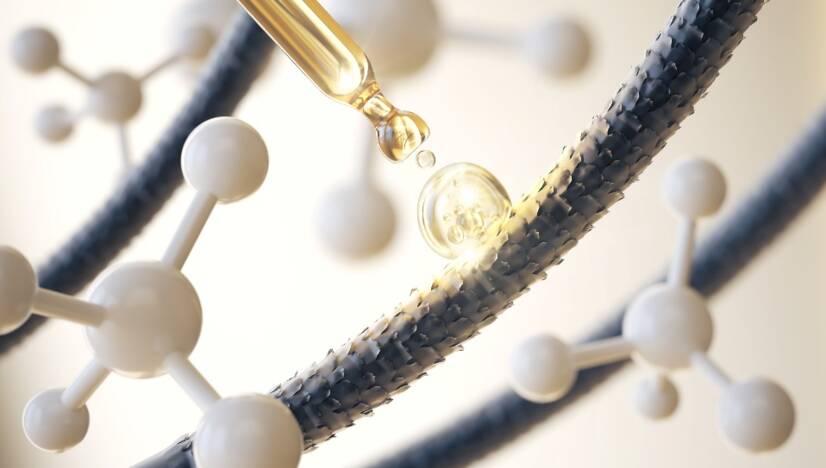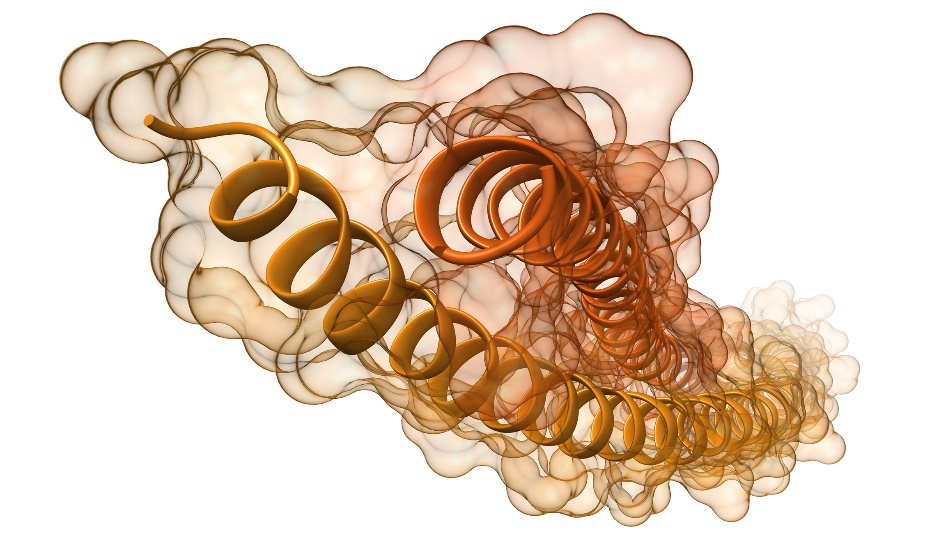- KUKLOVÁ, Ivana, HERLE, Petr, ed. Dermatovenerology for general practitioners. Prague: Raabe, c2011. ISBN 978-80-87553-28-2
- solen.cz - Diagnosis and treatment of the most common hair diseases. Solen. MUDr. Helena Michalíková
- healthline.com - What Is Keratin? Healthline. Christina Chun, MPH
- medicalnewstoday.com - What to know about keratin hair treatments. Medical News Today. Zia Sherrell, MPH
Keratin and its effect on health. What is its importance for hair?

Keratin is a fairly well-known term in the field of cosmetics and hair health. It is a protein that is mainly found in the hair structure. What are all the effects of keratin and why is it important for the body? Is it really effective in hair cosmetics?
Article content
Keratin is a protein that forms the basic building block of human hair. It is responsible for its strength, strength, elasticity, growth and overall quality. It is also found in other tissues of the human body.
Keratin is quite a popular ingredient in cosmetic products and hair supplements.
Its function in the body, sources in food, depletion, effectiveness of nutritional and cosmetic supplements and many other interesting information you will learn in the article.
What is keratin?
Keratin is a type of protein(macromolecular protein) that forms the basic building block of hair. In addition to humans, it is also found in the tissues of mammals, birds and reptiles.
In humans, keratin is found in hair, skin, nails and, to a lesser extent, in the tissues of internal organs and glands.
Keratin is formed in the human body from various amino acids (e.g. L-cysteine). Keratin then forms chains and complex fibres that are part of the structure of hair. These fibres in hair are spiral-shaped and form strong bonds that make hair strong and durable.
What function does keratin have in the body?
Human hair consists of up to 95% keratin, 5-10% water, lipids (fats), pigments and small amounts of various metals and minerals.
The main role of keratin in the body is to build the structure of the hair. It is responsible for their strength, firmness, growth, shape and quality.
It influences the shape of hair according to the even distribution of keratin. This results in curly, wavy or straight hair.
In straight hair, keratin is distributed evenly, in curly hair it is distributed alternately and unevenly.
Because keratin is the basic building block of our hair, it is used in cosmetic products and dietary supplements as an ingredient to enhance the overall quality of hair.
Keratin used in cosmetic products is obtained from the external tissues of animals (feathers, wool, etc.). However, it can also be obtained from plant sources. This makes some cosmetic products suitable for vegetarians and vegans.
Thanks to its properties, keratin is an important element for the health of our hair. In addition to giving it strength and elasticity, it provides external protection against low and high temperatures, humidity, electrification and frizz.
Summary of the effects of keratin on hair:
- Creates structure and texture in the hair
- Promotes hair health and quality
- Increases hair elasticity and resistance
- Counteracts frizz and electrification
- Acts as a regenerating and nourishing agent
- Gives hair shape and direction
- Protects hair from adverse external influences

Loss and loss of keratin
As long as the keratin in the hair is sufficient and intact, it is elastic, insoluble in water and fulfils its protective function.
The breakdown and disintegration of keratin can occur gradually due to old age, ageing, various diseases, hormonal changes and external influences.
External adverse influences include mechanical, thermal and chemical damage.
Keratin is somewhat resistant to heat from hair dryers, curling irons and flat irons. However, if used regularly, frequently and without prior treatment of the hair, the hair keratin can be gradually eroded.
Internal and external negative influences damage the keratin chains. Consequently, keratin can be washed out of our hair.
A healthy, regular, balanced and wholesome diet full of vitamins, minerals and especially protein plays an important role in keratin formation.
Natural sources that support keratin production
"Finished" keratin cannot be obtained from food. However, we can consume foods that contribute to its synthesis (formation).
Certain vitamins, minerals and food components help to create keratin and thus improve the condition of hair, nails and skin.
Biotin (vitamin B7), vitamin B6, the amino acid L-cysteine, glycine, zinc, vitamin C and vitamin A, as well as a number of different minerals promote the proliferation of keratinocytes and the cells that produce them in our body.
Keratin is produced in our bodies in the presence of the important microelements mentioned above, which are mainly found in proteins such as meat, fish, dairy products, soy and other foods such as vegetables, nuts and legumes.
A balanced, complete diet is therefore essential.
The following are examples of different foods containing ingredients that promote the production (synthesis) of keratin:
- Eggs are a potent source of biotin, a protein, and promote keratin formation. They contain the mineral selenium and both group A and B vitamins.
- Both onions and garlic are high in N-acetylcysteine, a plant antioxidant that the body converts to the keratin-forming L-cysteine. They help protect keratinocyte cells.
- Carrots are a source of biotin, vitamin A, vitamin C, potassium and vitamin K. They promote keratin and collagen synthesis.
- Salmon is a protein-packed fish and a source of biotin, an essential nutrient for promoting keratin formation. It is also high in omega-3 fatty acids, which promote hair growth and quality.
- Meat (especially beef) is a concentrated source of biotin, vitamin A and a large amount of protein.
- Sweet potatoes contain vitamins A, B and C. Carotenoids and vitamin A promote keratin synthesis.
- Sunflower seeds contain biotin, vitamin E, the minerals selenium, copper and pantothenic acid. They promote keratin formation and have plenty of protein.
Keratin in cosmetic products
There are many hair cosmetic products on the market today containing keratin - shampoos, conditioners, masks and various hair serums. Their main function is to strengthen keratin structures and thus keep hair healthy.
They serve to moisturize, nourish and shine the hair.
They help fight split ends and dry unruly hair.
Keratin is added to cosmetic products in a hydrolyzed form. It is usually extracted from bird feathers or sheep's wool, but vegan options are also available.
Some products contain a set of amino acids, the building blocks of keratin, instead of the keratin protein itself.
It is important to reach for proven quality brands that have a track record of results, reviews and studies. It is also advisable to consult a professional (hairdresser, dermatologist) who can advise you on what product is suitable for your hair type.
The Brazilian keratin treatment is also quite well known. This is a method performed by hairdressers in which a keratin-based product is externally delivered to the hair.
The process involves the application of a special cream to the hair, blow-drying and heat setting. The aim is to straighten and nourish the hair structure over a period of several months. The method should be carried out by a professional to avoid damaging and burning the hair at home.
The question is whether keratin cosmetic products actually work.
The answer is: yes, they do work, but you cannot expect miracles from them.
A quality product containing keratin can have a positive effect on the appearance, shine and overall quality of your hair after regular use.
However, with aging, advancing age, hormonal changes, unhealthy diet, inadequate intake of vitamins, minerals, proteins and regular harmful external influences, keratin can be lost from the hair. Not even cosmetic products that contain it can prevent this.
Keratin and dietary supplements
The market offers a range of keratin supplements, both on their own and as part of nutritional complexes to support hair, nail or skin health. Keratin supplements come in the form of capsules, tablets, loose powders or liquids.
In most cases, nutritional complexes are quite beneficial for hair, nail and skin health because they contain different groups of vitamins and minerals or herbal extracts.
Keratin, like collagen or any other protein, should be broken down into amino acids in the digestive tract after consumption. These are then used to form new proteins.
The effect of keratin in a dietary supplement can therefore target not only the hair, but also other body structures. In any case, however, it is beneficial in terms of protein intake.
There is no official daily dose of keratin and therefore the maximum daily dose recommended by the manufacturer should be followed.
Pregnant and breastfeeding women should consult their gynaecologist when taking a keratin product.
Interesting resources
Related










